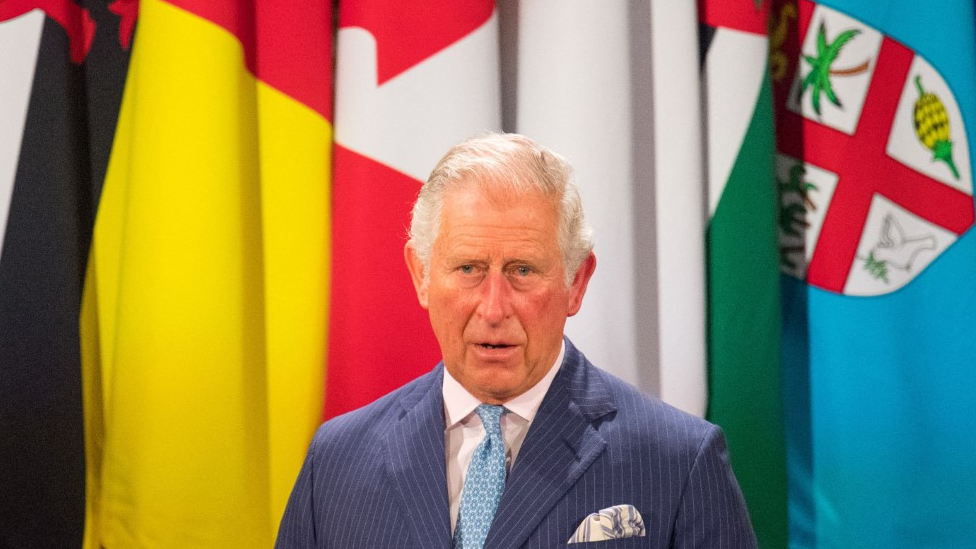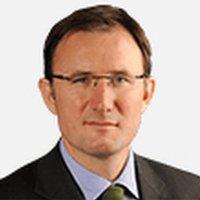Commonwealth Secretariat in 'urgent need' of reform
- Published
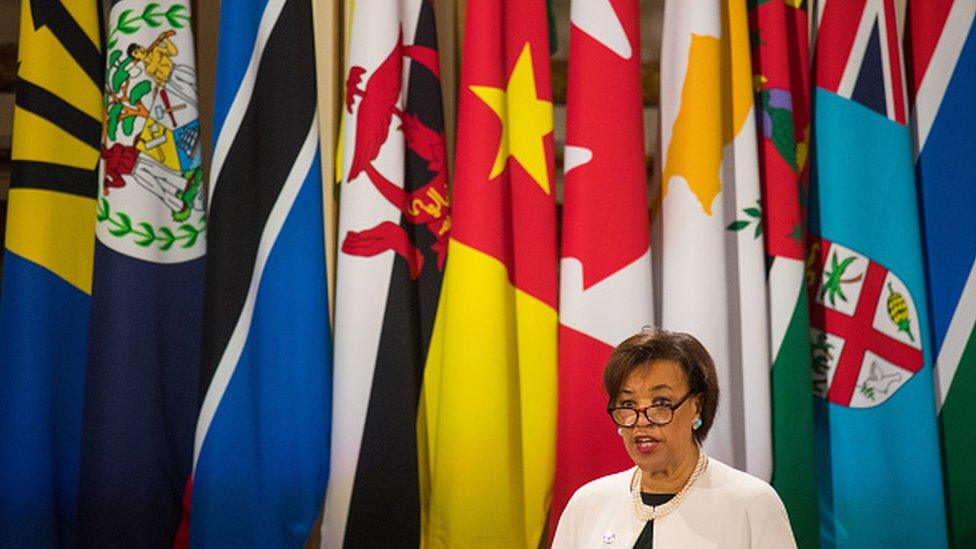
The Commonwealth Secretariat, run by Lady Scotland, is the organisation's main intergovernmental agency, facilitating cooperation among member governments
The Commonwealth Secretariat, the body that manages the international organisation in London, is in "urgent need" of reform, according to a leaked internal report obtained by the BBC.
It says there are "deep concerns" about the governance structures of the secretariat which "lacks clarity" in its priorities and needs to be "more transparent and accountable". It adds there is a "serious and urgent need" to stabilise the body's funding.
The secretariat is the central administrative hub for the Commonwealth which is made up of 53 countries - most of them former British colonies - which encompass almost a third of the world's population.
It is currently led by the Commonwealth secretary-general, the former Labour minister Baroness Scotland.
A separate survey of employees at the secretariat - also seen by the BBC - suggested there were "strong indicators of low morale" with "high levels of dissatisfaction with opportunities for career progression".
The BBC has also learned that a bitter dispute has broken out between the secretariat and other Commonwealth bodies over office space in London which could leave the organisation responsible for the Commonwealth Games having to find a new headquarters.
In the wake of the concerns, the Commonwealth's 52 high commissioners in London plus one senior British diplomat have drawn up new rules to try to improve the accountability of the secretariat.
These rules also make clear that Lady Scotland could be challenged if she tries to stay on in post after her first term of office runs out next year. The new rules state explicitly: "Re-appointment of a secretary-general for a second term is not automatic."
It is rare for Commonwealth secretaries-general to be challenged after their first term. Only six people have held the post since it was created in 1965 and most were reappointed unopposed. The only significant exception was Don McKinnon who was unsuccessfully challenged in 2003 by a Sri Lankan candidate representing southern African nations angered over the suspension of Zimbabwe from the Commonwealth.
The high commissioners - who make up the Commonwealth's Board of Governors - have also ordered an internal audit of procurement spending decisions by the secretariat since 2016 when Lady Scotland took up her post amid concerns that procedures may not have been followed correctly.
Some diplomats have also argued for an independent inquiry into the financial and reputational implications of two recent employment tribunals - one involving Lady Scotland's deputy - that the secretariat lost and could result in legal bills of more than £1m.
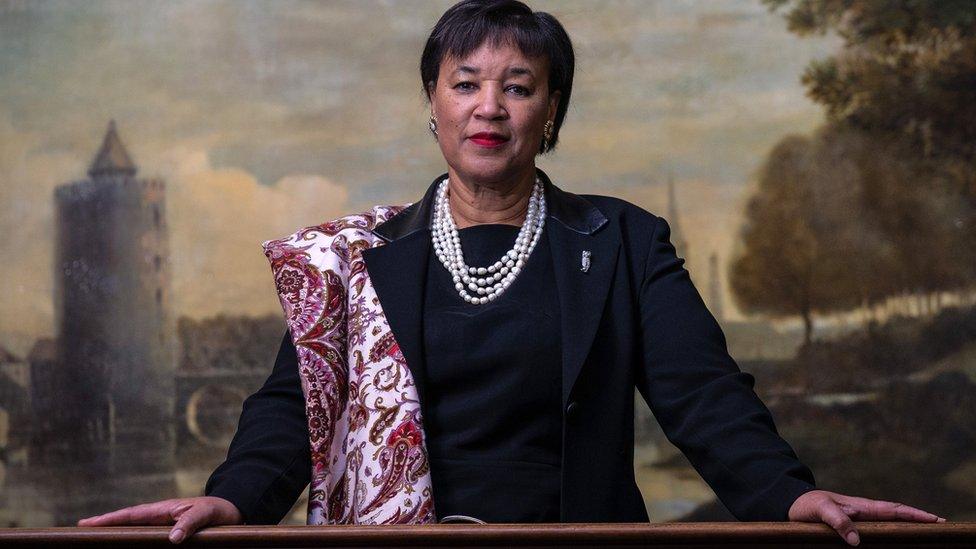
Lady Scotland became Commonwealth secretary-general in 2016
A spokesman for the secretariat said Lady Scotland was making the organisation more "dynamic and integrated" and the new rules had not yet been agreed by Commonwealth heads of government.
When those heads of government elected Lady Scotland in 2015, they instructed her to review the way the secretariat was being run. Three years later, she established a so-called 'high level group' of mostly former Commonwealth foreign ministers whose report last autumn was never published.
It concluded there was "an urgent need" for the governance structure of the secretariat to be reformed.
It said: "There is also an immediate need for redressing the lack of clarity in policy and priorities; for the secretariat to be more transparent and accountable to stakeholders."
There were "deep concerns about the adequacy of the current governance structures" and "there is a serious and urgent need to place the funding of the secretariat on a more stable and predictable footing".
In recent years, some member states have been less willing to give the organisation money. Its core budget has now sunk to just £32m, down from £52m in 2012/13.
Such are the financial pressures that the secretariat has decided to break the lease on a building it rents in Pall Mall called "Commonwealth House" that was opened by the Queen only in 2016.
'Splitting the Commonwealth'
Staff working for the secretariat in the building are being moved across the road to its Marlborough House headquarters but other affiliated organisations have been told - much to their anger - they will have to look for premises elsewhere.
They include the Commonwealth Games Federation, the Royal Commonwealth Society, the Commonwealth Local Government Forum and the Commonwealth Enterprise and Investment Council.
Commonwealth diplomats are so concerned they have ordered the secretariat to provide them with floor maps of Marlborough House so they can establish whether or not there is enough space for the accredited bodies. One source said: "She is splitting the Commonwealth."
Lady Scotland's supporters insist she is making progress reforming a dysfunctional secretariat and has ruffled feathers by making job cuts. Since 2016, the secretariat has cut staff from 295 to 223.
She told The Economist, external in April she had been "vilified" for shaking things up.
This was illustrated by the Commonwealth Secretariat Staff Association which conducted a survey of its members last November and found there were "strong indicators of low morale".
It suggested that a large proportion of employees had looked for work elsewhere and "66% of respondents would not recommend a friend to work at the secretariat".
Diplomats say Lady Scotland, who was attorney general under Gordon Brown, has already begun campaigning unofficially to secure a second four-year term in 2020 and has argued privately there was a reasonable expectation she should be reappointed unopposed.
But the 53 high commissioners in London agreed new rules in March confirming the unwritten convention that secretaries-general can be challenged when their first term of office ends.
They also tighten up the accountability and oversight of the secretariat, including regular assessments of the secretary general's performance.
The new rules have yet to be signed off by Commonwealth foreign ministers and eight have already rallied to Lady Scotland's cause, formally questioning the new provisions and whether they should apply to the current secretary-general.
The countries that objected to the new rules are thought to include the Seychelles, Nigeria, St Lucia, Barbados, Dominica, St Kitts and Nevis and Belize.
Foreign Secretary Jeremy Hunt has now written to those eight countries to try to address their concerns. The issue is expected to come to a head at a meeting of Commonwealth foreign ministers in London on July 10.
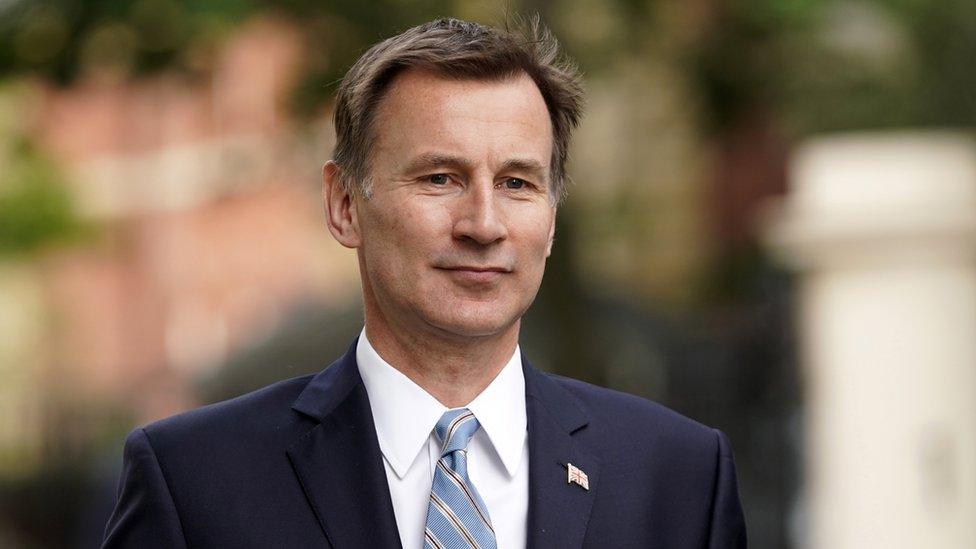
Foreign Secretary Jeremy Hunt is among those hoping to replace Theresa May as British prime minister
Britain is currently the so-called "chair in office" for the Commonwealth, having hosted the last heads of government meeting in London in 2018. Mr Hunt will at some stage have to decide whether or not the UK is going to support Lady Scotland's second term. It is understood no final decision has been made.
Despite concerns about the leadership of the secretariat in some Commonwealth capitals, no strong alternative candidate has yet emerged. But some sources suggest informal discussions have begun to draw up a list of potential names.
A Foreign Office spokesman said: "We are working with the secretary-general and fellow Commonwealth members to enhance the effectiveness of the secretariat. This is essential to fulfil the commission of heads of government at their meeting in Malta in 2015, and reiterated at their meeting in London last year."
How the secretariat responded
A spokesman for the Commonwealth Secretariat said: "The High-Level Group reports to Commonwealth heads of government and the latter have not yet considered this report, so it is not appropriate for the secretary-general or secretariat to make comments about its content or its conclusions.
"Since her assumption of duty, the secretary-general has made changes to the Commonwealth's organisational structure to make it more dynamic and integrated. She is confident that the great majority of staff are hard-working and committed to the Commonwealth. They are producing exemplary results."
The spokesman added: "The secretary-general is focused on delivering the mandate given to her by the 53 Commonwealth heads of government. During her tenure, the secretariat has received numerous commendations from member governments for its work.
"For example, here is a recent quote from the President of Seychelles, Danny Faure: 'I believe that the Commonwealth Secretariat is a believer of the Small Island Developing States and if today within the international forum, there is recognition of one's small states, it is because the Commonwealth Secretariat has played an important role.
"It is the responsibility of the 53 heads of government to appoint (and re-appoint) the Secretary-General. To date, no new rules for appointment of the Secretary-General have been agreed by the 53 heads of government."
The spokesman said it would not be appropriate for the secretariat to comment on the proceedings of confidential Board of Governors' meetings: "But please note that the secretariat operates a multi-layered system of checks, balances and audits that work independently from the secretary-general, including an audit committee that reports directly to the Board of Governors.
"The secretariat is working to mitigate a declining budget from member countries by entering into partnerships with international organisations and foundations.
"During recent years under the secretary-general's stewardship there has been a significant increase in extra budgetary funding, from £700,000 in 2012 to £3.5m in 2017.
"As part of the Commonwealth's effort to operate more efficiently, its Board of Governors approved a plan to move all Secretariat staff in Commonwealth House to Marlborough House by the end of 2019.
"Prior to the establishment of Commonwealth House, the Royal Commonwealth Society and the Commonwealth Games Federation had their own headquarter buildings."
- Published20 December 2018
- Published16 April 2018
- Published25 April 2023
